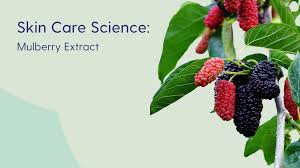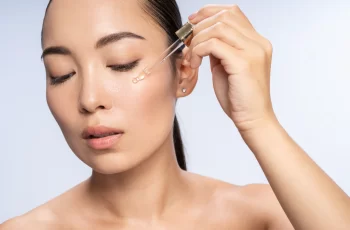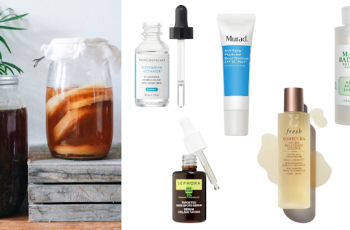
The Science of Mulberry Extract in Skin Care
Mulberry extract is known for its ability to brighten the skin and improve dark spots and other signs of hyperpigmentation. This ingredient, derived from the mulberry tree (Morus spp.), also has strong antioxidant and anti-inflammatory properties, making it a versatile ingredient that can help to reduce signs of skin aging and redness. To see if adding mulberry extract to your skin care regimen could be right for you, take a look at this deep dive into what this ingredient is, its benefits for the skin, and side effects to take into consideration.
Mulberry extract is known for its ability to brighten the skin and improve hyperpigmentation.
Its strong antioxidants also make it an effective anti-aging ingredient.
When taken orally, mulberry extract can have estrogenic effects.
What Is Mulberry Exract?
Mulberry extract is derived from various parts of the mulberry tree, a plant that has been used in traditional medicine for centuries. There are three main species of mulberry: red mulberry (Morus rubra), black mulberry (Morus nigra), and white mulberry (Morus alba). These species differ in their fruit color and geographical origin, but all share a common pool of active compounds that make them beneficial in skin care.
When it comes to skin care products, mulberry extract is most commonly sourced from the leaves or roots of the mulberry tree. Extracts from the root tend to be richer in skin-brightening compounds, while leaf extracts provide powerful antioxidants.
Active Compounds in Mulberry Extract
Mulberry extract contains a variety of bioactive compounds that contribute to its skin-enhancing properties. Key compounds include:
Arbutin. A glycoside with skin-brightening properties, arbutin inhibits the activity of tyrosinase, a key enzyme needed for the production of the pigment melanin. This makes mulberry an effective ingredient to reduce hyperpigmentation and promote a more even skin tone.
Mulberroside A. Another glucoside found in mulberry root extract, mulberroside A is known for its strong skin-lightening effects. It inhibits melanin production by targeting tyrosinase, making it highly effective in treating hyperpigmentation and reducing dark spots.
Flavonoids. These polyphenolic compounds have strong antioxidant and anti-inflammatory properties. The mulberry plant is particularly high in a type of flavonoid called anthocyanins, which provide strong antioxidant benefits, protecting the skin from oxidative stress and premature aging. Additionally, mulberry contains a flavonoid called astragalin, which has been shown to increase estrogen and progesterone levels when taken orally (3).
Alkaloids. These nitrogen-containing compounds play a significant role in the inhibition of tyrosinase, further enhancing mulberry extract’s ability to reduce melanin synthesis and brighten the skin.
Phenols. Phenols like catechin, ferulic acid, quercetin, and resveratrol are found in high concentrations in mulberry extract. These compounds have strong antioxidant, anti-inflammatory, and anti-aging effects by scavenging free radicals, reducing inflammation, and promoting skin cell renewal.
Benefits of Mulberry Extract for the Skin
Mulberry extract comes along with a variety of benefits for the skin, including:
Skin brightening. Most notably, mulberry extract helps to brighten the skin and improve dark spots and other signs of hyperpigmentation. It does this by inhibiting tyrosinase, the enzyme responsible for melanin production.
Antioxidant protection. Rich in flavonoids and phenolic compounds, mulberry extract provides powerful antioxidant protection, neutralizing free radicals that contribute to oxidative stress and thus preventing premature aging and skin damage.
Anti-aging. The antioxidants in mulberry extract also help to reduce the appearance of fine lines and wrinkles, promoting a more youthful complexion by protecting skin cells from damage and supporting collagen production.
Anti-inflammatory. Mulberry extract contains anti-inflammatory compounds that can soothe irritated skin, reduce redness, and help to calm conditions like acne and rosacea.
Antifungal and antibacterial. Mulberry extract has natural antifungal and antibacterial properties, helping to protect the skin from harmful microorganisms and reducing the risk of infection or irritation.
Side Effects of Mulberry Extract
Most side effects are associated with oral consumption or large topical applications of mulberry extract and are generally not a concern when used in smaller amounts in skin care products. Still, it is important to be aware of potential side effects and discuss with your doctor if you have any concerns before using mulberry extract.
The three most common potential side effects when taking oral mulberry extract or using high doses of topical extract include:
Increased estrogen levels. Mulberry extract may have mild estrogenic effects, which could be a concern for those with hormone-sensitive conditions. However, this can be beneficial if you are having menopausal skin symptoms.
Lowered blood sugar. Mulberry can reduce blood sugar levels, so individuals on diabetes medications should consult their doctor before use.
Digestive upset. Some people may experience mild digestive discomfort with oral use, though this is rare in topical applications.
Who Should Not Use Mulberry Extract
Given its potential to influence estrogen levels, people with hormone-sensitive conditions should talk to their doctors before using mulberry extract, though these effects are typically rare in small topical doses. This includes people with a history of breast, ovarian, or uterine cancer or those undergoing hormone replacement therapy. If you’re pregnant or breastfeeding, it’s also best to talk to your doctor before using products containing mulberry extract.
Products That Contain Mulberry Extract
Skin care products containing mulberry extract are typically focused on brightening the skin, reducing dark spots, and improving an uneven skin tone. The Skinceuticals Phyto Corrective Serum has such a small amount of mulberry extract in it that it probably has minimal activity.
Some of my favorites include:
Research Studies
Skin Lightening Studies: Mulberry extract, particularly from species like Morus alba and Morus nigra, has been extensively studied for its skin-lightening properties. Several components, including mulberroside F and oxyresveratrol, have been shown to inhibit tyrosinase, the enzyme responsible for melanin production. Lee et al. (2002) found that mulberroside F suppressed tyrosinase activity and melanin biosynthesis in vitro, making it a viable skin-lightening agent. Moreover, a 2011 study on Filipino patients demonstrated significant improvement in melasma when treated with 75% white mulberry extract, showing reductions in melanin content and melasma severity (Alvin et al., 2011, J Drugs Dermatol).
Anti-Redness Studies: While direct studies focusing on mulberry extract’s anti-redness properties are limited, its anti-inflammatory and antioxidant actions suggest it may help reduce redness in skin conditions. For example, the presence of quercetin and other polyphenols in mulberry leaves has demonstrated antioxidant effects in various models, which can help mitigate oxidative stress and inflammation that contribute to redness (Enkhmaa et al., 2005, J Nutr).
Anti-Aging Studies: Mulberry extract has also shown promise in anti-aging research due to its antioxidant properties. Studies on mulberry leaf extracts have demonstrated their capacity to reduce oxidative stress markers, which can contribute to skin aging. For instance, mulberry extract has been shown to modulate enzymes involved in oxidative damage, suggesting its potential for anti-aging formulations (Prasad et al., 2004, J Pharm Pharmacol). Furthermore, compounds like oxyresveratrol from mulberry have shown strong antioxidant and anti-inflammatory effects, which are critical in preventing and treating signs of aging.
These studies collectively indicate that mulberry extract is a potent multi-functional ingredient in dermatological products, contributing to skin lightening, redness reduction, and anti-aging efforts.
Bottom Line
Mulberry extract is a powerful natural ingredient that offers a range of skin benefits, from brightening the skin to protecting against environmental stressors. Its ability to inhibit melanin production makes it particularly effective for those dealing with hyperpigmentation and dark spots. However, due to its potential estrogenic effects, mulberry extract may not be right for everyone. Talk to your doctor before using this ingredient if you are concerned about increased estrogen.


